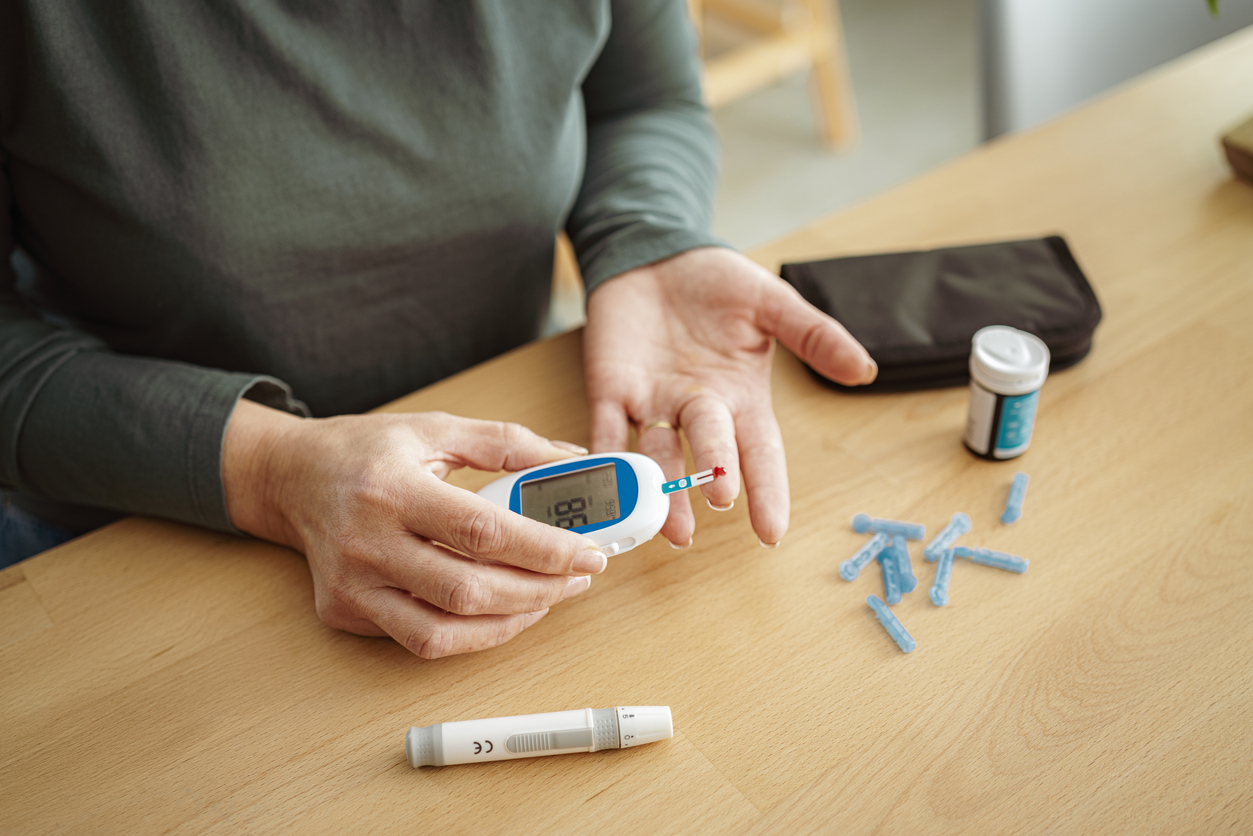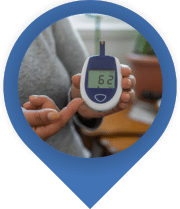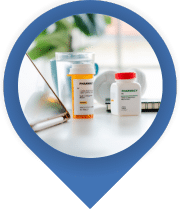The Latest Healthcare News
Check out our blog to learn more from our team about the latest medical advancements, health tips, and primary care news.

Diabetes is a complex condition with no known cure. And because diabetes affects everyone differently, you need a management plan that is individualized to your needs. The experienced healthcare professionals at AllCare can help you understand how to manage your diabetes effectively and improve your overall quality of life through expert advice, personalized management, and support plans for patients with diabetes.
Diabetes is a chronic condition that impacts how your body converts food into energy. In the United States, more than 35 million people live with diabetes, and this number is expected to grow. Type 2 diabetes is the most common form and makes up 90% to 95% of all cases. While lifestyle changes can help reduce the risk of serious complications, having a dedicated healthcare team on your side is essential to help you monitor your condition and manage any additional symptoms.
AllCare healthcare professionals have extensive experience treating patients with diabetes. Our compassionate primary care providers offer support from diagnosis, personalized treatment, lifestyle changes, and diabetes specialist recommendations—giving you the tools to monitor and manage your diabetes and live healthier.
Diabetes mellitus, commonly known as diabetes, is a chronic condition where your blood sugar (glucose) levels are consistently too high. This happens when your pancreas doesn’t make enough insulin, or your body can’t use it well. Insulin is essential for transporting glucose from the food you eat to your cells to provide energy. Without enough insulin, glucose builds up in your bloodstream, causing high blood sugar (hyperglycemia). Over time, this can lead to serious health issues like heart disease, nerve damage, and eye problems.

While too much glucose in your bloodstream is the root cause of diabetes, the reasons why your blood glucose levels are high depend on the type of diabetes you have. Diabetes causes may include:

Regularly track and control blood sugar levels through monitoring techniques to maintain optimal glucose levels and adjust treatment plans as necessary.

Evaluation, management, and prescription of diabetes medications and supplies, including glucose meters and monitors, to ensure effective control of blood sugar levels.

Because people with diabetes have a higher risk of developing high blood pressure and heart disease, it’s important to receive regular monitoring to help identify any problems early on.

Comprehensive education and training on diabetes self-care, including monitoring techniques and medication. Eating healthy and exercising may also help manage diabetes.

Routine evaluations and monitoring of key health indicators, including blood pressure, cholesterol levels, and kidney function, to detect and address potential complications associated with diabetes.

When needed, we provide referrals to specialists, such as endocrinologists or registered dietitians, for specific diabetes-related concerns.

There are different types of diabetes; however, Type 1, Type 2, and gestational diabetes are the most common.

Experience the convenience of telehealth appointments at AllCare. Our telemedicine services are designed to provide you with seamless access to healthcare without the need to leave your home. Whether you need an online doctor’s appointment for immediate or primary care, AllCare’s got you covered. With our online telehealth services currently available to individuals located in Virginia, Maryland, and Washington, D.C., you can connect with our experienced immediate and primary care physicians via secure video calls.
At AllCare, we are expanding our virtual healthcare access to all services previously offered in person. This includes:
Managing diabetes involves several key strategies tailored to each individual’s needs, including:
In addition, maintaining a healthy weight, blood pressure, and cholesterol levels is crucial due to the increased risk of heart disease associated with diabetes.
Yes, diabetes can be genetic, but both hereditary and lifestyle factors play a role in its development. Type 2 diabetes has a strong genetic link, with the risk increasing if multiple family members have the condition. Studies of twins suggest genetics significantly influence Type 2 diabetes, and race can also be a factor. However, lifestyle choices, such as diet and exercise, are major contributors to its development. Type 1 diabetes is caused by a combination of genetic and environmental factors, including viral infections. Unlike Type 2, most people with Type 1 diabetes do not have a family history of the disease. Monogenic diabetes, a rare form, results from a mutation in a single gene. In most cases, the gene is inherited from one or both parents. While genetics can increase the risk of diabetes, lifestyle modifications can often help prevent or delay the onset of Type 2 diabetes.
Diabetes is diagnosed through blood tests that measure blood sugar (glucose) levels. The most common tests include:
For Type 1 diabetes, doctors may also check for autoantibodies, which indicate an immune system attack on insulin-producing cells. Gestational diabetes is diagnosed with a glucose challenge test during pregnancy.
Note: If results are borderline, additional testing may be required to confirm the diagnosis.
Also called: High blood sugar, hyperglycemia, type 1 diabetes, type 2 diabetes, prediabetes, gestational diabetes
Diabetes symptoms vary by type and how high your blood sugar is. Some types develop gradually with few signs, while others cause sudden, more noticeable symptoms. General symptoms of diabetes include:
Medically reviewed by AllCare Primary & Immediate Care
While some risk factors for Type 2 diabetes, like genetics, age, and race, are out of your control, there are still plenty of ways to reduce your risk. By making healthy lifestyle choices and staying on top of regular check-ups, you can take charge of your health and lower your chances of developing diabetes. Here are some key steps to consider:
If you have diabetes, it’s important to limit foods that cause blood sugar spikes. Sugary drinks like soda, energy drinks, and fruit juices can lead to rapid glucose increases, while highly processed carbs—such as white bread, pasta, and pastries—break down quickly into sugar, making blood sugar harder to control. Fried foods like French fries and fast food are not only high in unhealthy fats but can also contribute to insulin resistance. Many packaged foods, including breakfast cereals, granola bars, and canned soups, contain hidden sugars and refined carbs that can impact glucose levels. Even seemingly healthy options like flavored yogurts, dried fruits, and smoothies often have more sugar than expected. Instead, focusing on whole, fiber-rich foods can help keep blood sugar stable and support overall health.}
Note: If you are experiencing abnormal diabetes symptoms, please visit our immediate care service clinics.
At AllCare, we’re proud to deliver exceptional primary and immediate care to residents across Virginia, Maryland, and Washington, D.C. From bustling city centers to serene suburban neighborhoods, our clinics are strategically placed for your convenience and care. Experience top-tier diabetes management in your community with AllCare, where your health is our priority.
Check out our blog to learn more from our team about the latest medical advancements, health tips, and primary care news.
Seasonal Affective Disorder (SAD) represents a significant mental health concern affecting approximately 5% of adults in the United States. This […]
Read More >Mammograms save lives. Early detection of breast cancer through proper screening will give a patient a remarkable 99% five-year survival […]
Read More >Most people are aware that diet, exercise, and genetics affect cholesterol levels. But can stress raise your cholesterol? The answer […]
Read More >Our related healthcare services extend beyond immediate care to include preventive care such as routine physical exams, chronic disease management for conditions like diabetes, and specialty care referrals for more complex health issues.